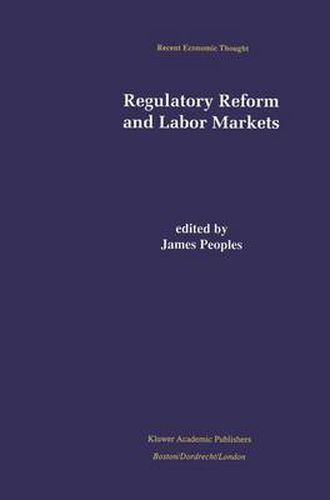Readings Newsletter
Become a Readings Member to make your shopping experience even easier.
Sign in or sign up for free!
You’re not far away from qualifying for FREE standard shipping within Australia
You’ve qualified for FREE standard shipping within Australia
The cart is loading…






This title is printed to order. This book may have been self-published. If so, we cannot guarantee the quality of the content. In the main most books will have gone through the editing process however some may not. We therefore suggest that you be aware of this before ordering this book. If in doubt check either the author or publisher’s details as we are unable to accept any returns unless they are faulty. Please contact us if you have any questions.
Regulatory reform represents a major shift in the US Government’s role toward price determination in the transportation and telecommunication industries. The resulting policy emphasizes dependence on market forces to set prices and to encourage efficient production techniques. While extensive research investigates the influence of deregulation on prices, profits and productivity, the effect on labour markets has not received the same scrutiny. Firms in these industries are of major importance to business operations in other industries because they provide the critical services of transporting goods and transmitting information. This may partly explain such extensive research on the product-market aspects of regulatory reform. Examining labour markets in the transportation and telecommunications industries is also highly warranted, as historically these industries represented some of the most heavily unionized sectors in the economy. The extent to which regulatory reform has encouraged product market competition may not necessarily result in the same degree of competition across industries. This work debates the notion that research on regulatory reform and labour markets should develop within the framework of the competitive model. It presents diverging views on wage and employment determination in distinctly different deregulated industries.
$9.00 standard shipping within Australia
FREE standard shipping within Australia for orders over $100.00
Express & International shipping calculated at checkout
This title is printed to order. This book may have been self-published. If so, we cannot guarantee the quality of the content. In the main most books will have gone through the editing process however some may not. We therefore suggest that you be aware of this before ordering this book. If in doubt check either the author or publisher’s details as we are unable to accept any returns unless they are faulty. Please contact us if you have any questions.
Regulatory reform represents a major shift in the US Government’s role toward price determination in the transportation and telecommunication industries. The resulting policy emphasizes dependence on market forces to set prices and to encourage efficient production techniques. While extensive research investigates the influence of deregulation on prices, profits and productivity, the effect on labour markets has not received the same scrutiny. Firms in these industries are of major importance to business operations in other industries because they provide the critical services of transporting goods and transmitting information. This may partly explain such extensive research on the product-market aspects of regulatory reform. Examining labour markets in the transportation and telecommunications industries is also highly warranted, as historically these industries represented some of the most heavily unionized sectors in the economy. The extent to which regulatory reform has encouraged product market competition may not necessarily result in the same degree of competition across industries. This work debates the notion that research on regulatory reform and labour markets should develop within the framework of the competitive model. It presents diverging views on wage and employment determination in distinctly different deregulated industries.